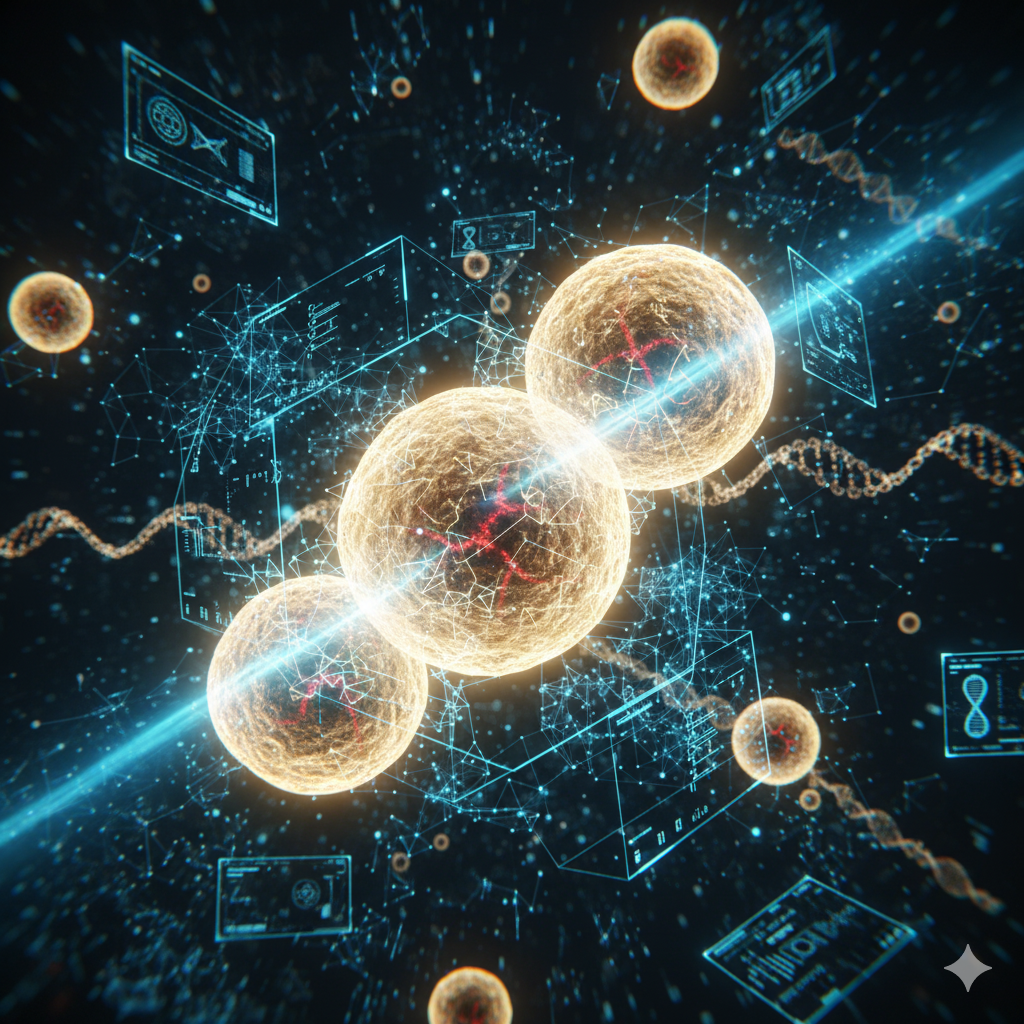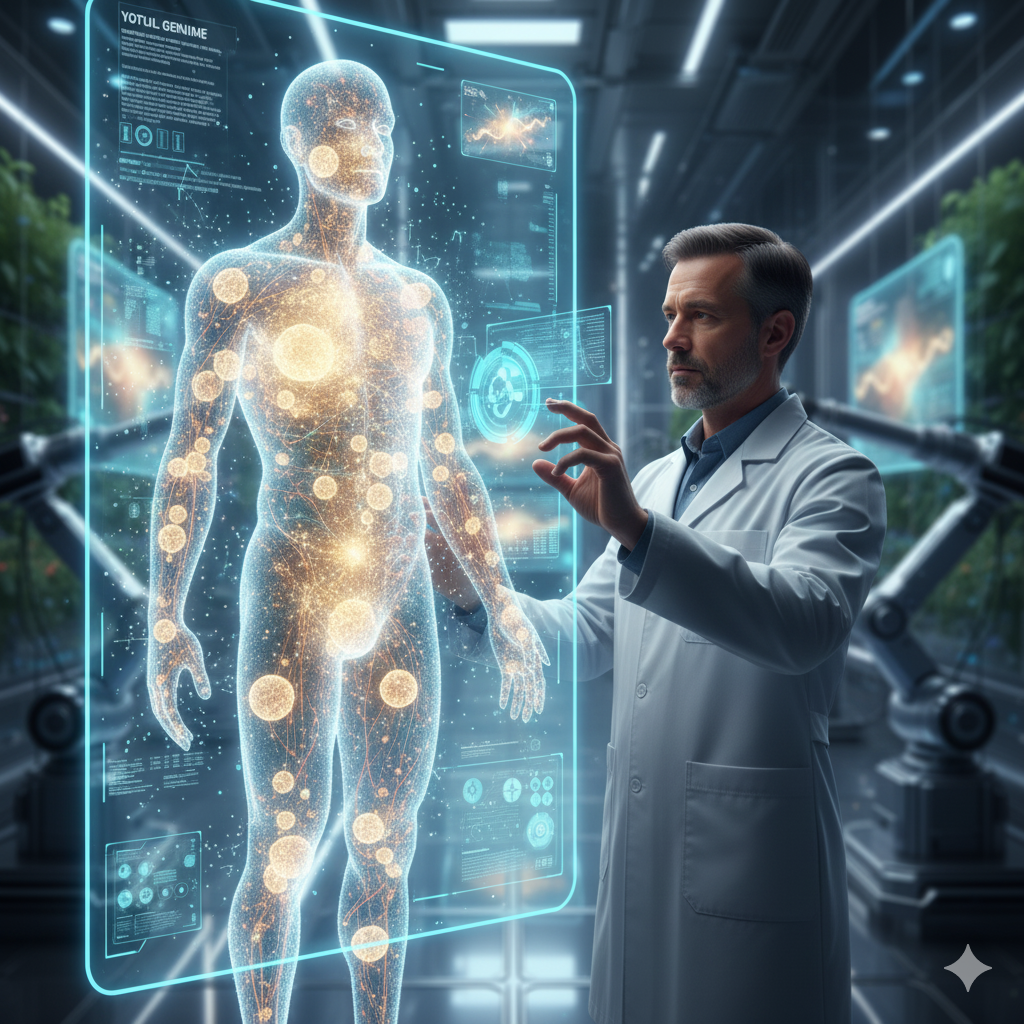The Dream of Eternal Youth (Introduction)
(AI Might Hold aging) : For centuries, people have sought a way to stay young. From elixirs of youth in antiquity to contemporary medicine, the hope of eternal youth has been prevalent among all walks of life, from scientists and philosophers to ordinary people. Today, we stand at the brink of a scientific revolution that could make this dream come true not through magic, but through artificial intelligence. AI is not just changing industries like health care, finance and education — it might solve one of humanity’s oldest existential conundrums: aging itself. The immune specialist Derya Unutmaz has foreseen a time when 80- to 100-year-olds would recover the biology of a 20-year-old. This is no longer the stuff of science fiction — it’s entering the realm of scientific feasibility. There is an incredible opportunity for AI to crack the code of aging —the most complex thing we work on. By sifting through enormous biological data sets, AI can come up with patterns and predict interventions that human beings left to their lonesome might never notice. Is AI finally the missing piece to keep we humans forever young? Let’s explore.

The Science Behind Aging
The only thing aging has to do with wrinkles or gray hair is that it’s a biological process. Cells get damaged, DNA loses its strength and immune systems weaken over time. This decay diminishes energy, elevates the likelihood of disease, and shortens life.
You can talk about taking supplements, hitting the gym or that great night cream all day long, but today’s anti-aging treatments barely scratch the surface. They slow down aging, but don’t really reverse it at a basic level. For scientists the question becomes: Can we reset the biological clock?
This is where AI steps in. By trying to understand what happens at the cellular level in millions of medical records, AI can figure out your body’s own biomarkers of aging — tiny signs that appear in people over time inside their blood, skin and DNA that reveal our age. What would take many years for humans to explore, AI can do in days by analyzing data — rather than testing it out in real life over decades.Already, as a simple example, scientists at DeepMind and Harvard University are using AI to model protein-folding and cellular behaviors in pursuit not only of electronics inventions but breakthroughs in age reversal. (Harvard Longevity Study)

AI-Powered Longevity Research
AI is transforming longevity research in three crucial ways:
Drug Discovery: It usually takes 10–15 years for a new drug to develop. AI can create new anti-aging compounds in just a few months by analyzing how they’d affect cells. Insilico Medicine, for instance, has already developed AI-designed drugs that it is testing to treat age-related diseases.
Personal Health Plans: AI can interpret your genetics, diet, sleep and lifestyle to create custom longevity plans. Picture an AI that could inform you what to eat — or how to exercise — to live longer.
Cellular Reprogramming: Researchers are testing the idea of “resetting” cells back to a younger state. AI makes this process even more efficient by virtually trying millions of gene-editing scenarios and minimizing risk and cost.
By combining AI and biology, we may soon have the ability to not just extend life, but to restore youth or even reverse aging itself. If AI keeps accelerating discoveries, humans could be living 100 healthy years as if we were 20 before too long.

The Promise and the Hype
There’s little question that AI has opened doors previously unimaginable. But too much excitement means hype — and hype always needs to be tempered with reality. We’re still in the dawn of the age when AI-inspired discoveries are translated into actual new treatments for patients, scientists caution.
Yes, AI can predict therapies with the potential to extend human life but testing them in real humans is time-consuming. Clinical trials are long, costly and have to show that a treatment is safe. What appears to be a winning formula in AI simulations is not necessarily successful in the real world.
That said, this doesn’t take away from what can happen. Consider the way A.I. seemed like science fiction in areas such as art, medicine and space exploration — but now seems routine. A similar fate may soon befall research into aging.Indeed, companies like Altos Labs (funded by Jeff Bezos) and Calico Life Sciences (funded by Google’s parent company, Alphabet) have invested billions to unlock age reversal technologies with artificial intelligence at the heart of their efforts. (Altos Labs Research)
Ethical Questions of Reversing Aging
If AI enables us to turn back the biological clock, humanity confronts profound ethical questions. Who has access to these treatments? Will it be only for the wealthy, or can a version become an option for everyone?
Another concern is overpopulation. If humans start to live 120, 150, or even more years with youthful energy, what are the implications for resources, jobs and the planet’s balance?
And there are also the philosophical questions: If aging is no longer inevitable, how do we redefine the meaning of life? Does death no longer have its proper place in the circle of life?
AI reversing aging could be mankind’s best gift—or, if mismanaged, it could lead to a schism among people. Those are questions policy makers, scientists and ethicists will need to tackle soon.

What the Future Could Look Like
Imagine the year 2050. An 85-year-old grandmother helps playing soccer with her grandchildren, moving around as if she were a 20-year old. Breaking: An elderly scientist of 90 years still able to perform and function. The age of retirement moves, and people have many lives, in career terms, across centuries.
This vision may sound like science fiction, but if AI fulfills only part of its promise, it is likely to have a dramatic impact on society. The health care industry would be no longer about taking care of chronic diseases so much as helping people hang on to youth.
Longevity might be the new normal, and age might not limit ability. Rather, it could be energy and mindset or the decisions we make about our lifestyle choices — informed by machine learning insights — that determine where we end up.

Conclusion – Can AI Reverse Aging Forever?
The question remains: Can AI truly reverse human aging forever? While scientists cannot guarantee immortality, the evidence suggests AI will play a key role in extending both the length and quality of human life.
Whether through personalized health, AI-designed drugs, or cellular reprogramming, the dream of regaining youthful biology may soon shift from science fiction to medical fact.
The road is long, but every breakthrough brings us closer. What once seemed impossible may become normal in our lifetime.
One day, when people look back at the early 21st century, they may say: This was the moment humanity unlocked the secret of time—with the help of AI.
Discover the hottest AI tools across the globe

Comments